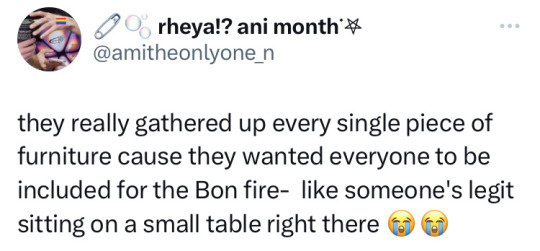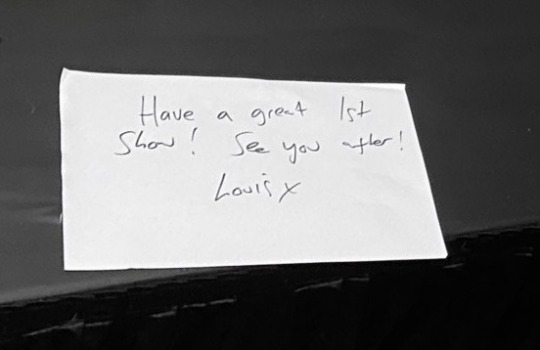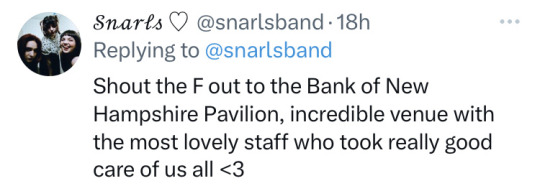#Louis hanging out with the support acts is very Louis and not the industry practice as compared to other artists
Explore tagged Tumblr posts
Text






🔥 Louis is sitting with his team, Snarls and The Academic around the fire. Craig Fitzgerald (co-writer on Headline) is on Louis' right and I think Chris Frewin on his left.
FITFWT Gilford, 27 May 2023 x x
#Louis Tomlinson#Louis is in the white green and yellow shirt he wore onstage#with his back to us#its so cool the touring party hang out together like this#Louis hanging out with the support acts is very Louis and not the industry practice as compared to other artists#Louis IG#team Louis#snarls#the academic#Craig Fitzgerald#Craig is wearing the same cardigan he wore on his social media that night of the concert#FITFWT Gilford#27 May 2023#mine
61 notes
·
View notes
Text
This Is Not A Sentence
Obedience to authority is where reason goes to die. I’m most disgusted by my obedience to things because I know I can be unmindfully obedient to a lot of things in life. I’m working on it. You could say that’s where a lot of wish-fulfillment comes from in my dreams, when I’m angry and shouting at others, because it’s proof that I could stand up and stick up for myself in real life. Of course, even those dreams aren’t so straightforward. One dream I had, I was running after some boy when the police came after us. They chased him into a train station and out of sight. I thought that was the end of it - until the very next day, when I took the train and saw him strung up by his neck, hanging from the ceiling with a noose around his throat.
According to Georg Wilhelm Hegel, man’s consciousness is his freedom to use consciousness; he hoped one day man’s individual consciousness could be connected with a greater, social consciousness, only possible in a political society which gave man the most freedom.
Another perspective is offered by Max Horkheimer. Horkheimer argued that the soldier who goose-steps out of sync is the one who has the most freedom; he understands the greatest constraints on freedom.
With these perspectives in mind, this relates to the aim of this essay: to discuss the importance of critical reflection which can help us imagine an alternative society and possibilities for social freedom in the future.
As pressing and urgent as current crises may seem in their call for our action, we should also feel humbled by previous generations of theorists and intellectuals who have passed before us. With their knowledge and unique perspectives on society, we can hopefully learn and gain from them so that we can make a difference on our society today.
As previous perspectives suggested, critical theory helps us understand society through a dialectical, immanent process. This means that analytical or single-issue understandings of society aren’t helpful in understand how society has formed, often through conflict, contradiction and antagonism between different aspects of society.
This thought process is drawn out in Theodor Adorno’s theory of negative dialectics, who argues that the critical task of social analysis is to find possibilities for a social theory which doesn’t explain society as a sum of individual parts, but expands and elaborates on its elaborations which prevent it from achieving a total whole; society is a type of ‘non-identity’, with individual and society disconnected and fragmented from each other, which makes attempts to create possible reconciliations between these differences bourgeois and normative tools of social control.
Indeed, this is also argued in Horkheimer’s explanation of critical theory as opposed to traditional philosophical theory. Horkheimer argued that traditional theory has previously negelected how knowledge is generated and produced as an economic materiality within a specific mode of production; categories of knowledge are only a reflection of the power dynamics and structures it is constructed in, used to legitimise existing institutions which perpetuate social domination of the ruling classes.
Some features of critical theory via the Frankfurt school include immanent critique, speculative theory and dialectical reason. These features help us to critically engage with society as an ongoing intellectual project which examines future possibilities for human emancipation.
With such an ambitiously theoretical front, some theorists are also justified in exploring the divide between theory and practice. Erich Fromm was an example of a Frankfurt school theorist who accepted some need for division for theory and practice; as a psychoanalyst, he appreciated that the greatest concern should be showed to the patient’s recovery as opposed to conforming to theoretical dogma. Similarly, he was ambivalent about applying Freud’s theory of psychoanalysis which was in parts instinctive and didn’t derive from critical understandings of society based on social organisation. He said that the ultimate goal was to understand how the human condition could grapple with questions of human freedom won in the age of modernity without collapsing into old regimes of automatism and conformism seen in late industrial society; doing things the same because they were done before is an example of authoritarian behaviour, without capacity for individual initiative and self-actualisation seen in creative arts.
This demonstrates perhaps limits to theory. After all, as Karl Marx argues, the point of philosophy is not interpret the world, but to change it.
Similarly, Pierre Bourdieu supported practice theory, which argued that social norms and behaviours were practised before awareness could be raised of them in a pre-linguistic realm; this was called ‘habitus’ as a social field of actions. This suggests limits to social theory if attempts to explain behaviour are hindered by our previous interactions and engagements with behaviour.
This joins discussion of critical theory with historical theorists like Aristotle and Avicenna, who were interested in material, evolutionist understandings of society as the elaboration of contradictions which would resolve themselves through participation and engagement rather than isolated self-contemplation.
It could also be question whether such isolated self-contemplation is possible: indeed, individual consciousness could be structured in radically social ways. According to Marx, it is not one’s individual consciousness which determines their social status, but the inverse.
According to Louis Althusser, the ideological state apparatus stabilises actors into individual subjects as citizens. This form of social control is practised through interpellation where the individual walking on the person is unaware of their status of their individual until he is hailed and this brought into his attention, as a violent act of alienation.
Michel Foucault moves further than Althusser’s theory of ideology and argues we should be more interested in knowledge theories as discourses of power. Discourse creates regimes of knowledge, which create subjectivities and discipline subjects. This demonstrates the wider ambition of the modern state, to discipline bodies that conform to social norms; the soul is the prison of the body.
Overall, discussion has led to different perspectives in critical theory about how to engage with issues of social inequality and power disparities. Firstly, critical theory via the Frankfurt School helps to criticise the subject/object dichotomy by arguing that the individual’s fragmentation and dispersal in modern, industrial society has created a reconcilable ‘non-identity’, the contradictions of which can only elaborated through processes of social critique called ‘negative dialectics’ for Adorno. Secondly, limits to theory are offered by thinkers like Marx and Bourdieu’s practice theory, which suggest that philosophy is a set of contemplative practices which risk distracting participants from the real business of enacting social change through engagement and active participation in the generative materiality of society. Thirdly, Althusser offers ways to join structuralism in discussion with Marxism, by arguing that critical issues have structural and linguistic features which can be critiqued. Finally, Foucault suggests there are possibilities to talk about social change beyond the parameters of Marxist theory, which suggest that every knowledge theory should be subject to criticism about power, discipline and the constitution and regulation of subjectivities as historical byproducts of cultural discourse.
***
Sometimes I want to be by my own.
I feel angry people don’t share the same interests as me. Most of all, I’m scared people won’t understand me, feel uncomfortable around me, and eventually reject me.
I spend a lot of my time on my own reading and reflecting about the society I see around me. But I feel like I’m doing something wrong if I can’t join in with the interests other people have and feel like I belong somewhere and people really care about me.
It can be self-repetitive cycles of anger and sadness in loneliness. I read more, but it doesn’t fix how detached I feel from everyone else.
0 notes